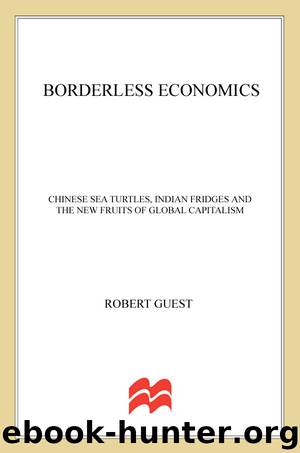Borderless Economics: Chinese Sea Turtles, Indian Fridges and the New Fruits of Global Capitalism by Robert Guest

Author:Robert Guest [Guest, Robert]
Language: eng
Format: mobi
ISBN: 9780230104433
Publisher: St. Martin's Press
Published: 2011-11-07T16:00:00+00:00
7
“A PONZI SCHEME THAT WORKS”
WHY MIGRANTS CHOOSE AMERICA
In a field in Delaware, a hundred teams are vying to see whose machine can hurl a pumpkin farthest. Some have built medieval-looking trebuchets. Some have built pedal-powered doohickeys. No explosives are allowed at the annual Punkin Chunkin—a rule that galls some contestants. Yet the biggest air cannons, with barrels up to 150 feet long, can shoot their fruit projectiles most of a mile. “It’s one heck of a peashooter,” marvels a spectator.
Need I mention that virtually all the competitors are male? Dorothy Blades, a rare female chunker with a pink hard hat, pink gloves and a pink cannon, speculates that men crave that sense of power that only blasting a pumpkin into orbit in front of a large crowd can provide. “Plus, it’s a drinkathon,” she adds.
The Punkin Chunkin shows what can be achieved when hundreds of mechanically adept minds focus on one utterly pointless objective. The hydraulics on those air cannons must be engineered just so, as must the springs on the catapults. The machines’ names—of course they have names—must be either macho (“Second Amendment”) or crude (“Chunkin Up”). Distances must be measured with a handheld GPS system that gives readings to the nearest hundredth of a foot. After each pumpkin lands, eager men on quad bikes zoom around looking for the crater, and then start triangulating.
All in all, the Punkin Chunkin is a perfect illustration of what makes the United States great. Only in the richest country on Earth could regular guys spend tens of thousands of dollars building a pumpkin gun. Only in a nation with such a fine tradition of inventiveness, not to mention martial prowess, would so many choose to do so. And only in a land of wide-open spaces would they be able to practice their “chunkin” without maiming their neighbors.1
If I sound flippant, it’s to make a serious point. As I write, Americans are feeling pessimistic. Only a third of them think the country is on the right track.2 Only about half expect their children to enjoy a better standard of living than they do.3 The country is struggling to emerge from the worst recession since the 1930s. It is weighed down by debt, riven by political partisanship and seemingly incapable of addressing its long-term budget woes.
Fareed Zakaria, of CNN, talks of a “post-American world.” The Onion, a satirical newspaper, reports that the last man who believed in the American dream, a bar worker in Pennington, Illinois, has finally given up.4
I find such pessimism overblown. America has profound economic problems, to be sure. But despite the decline of the past few years, my impression of the United States—after tramping around 44 of them— is one of spectacular material abundance. I’m not talking about the way the superrich live. An American billionaire’s lifestyle is not so different from that of a billionaire anywhere else. What is conspicuous about America is that ordinary people—plumbers, police officers, middle managers and the like—enjoy a standard of living that foreigners can only marvel at.
Download
This site does not store any files on its server. We only index and link to content provided by other sites. Please contact the content providers to delete copyright contents if any and email us, we'll remove relevant links or contents immediately.
The Meaning of the Library by unknow(2573)
Six Billion Shoppers by Porter Erisman(2305)
Why Nations Fail: The Origins of Power, Prosperity, and Poverty by Daron Acemoglu & James Robinson(2299)
No Time to Say Goodbye(2119)
Red Notice by Bill Browder(2082)
Currency Trading For Dummies by Brian Dolan(1929)
The Economist [T6, 22 Thg9 2017] by The Economist(1927)
Thank You for Being Late by Thomas L. Friedman(1772)
Bitcoin: The Ultimate Guide to the World of Bitcoin, Bitcoin Mining, Bitcoin Investing, Blockchain Technology, Cryptocurrency (2nd Edition) by Ikuya Takashima(1699)
Amazon FBA: Amazon FBA Blackbook: Everything You Need To Know to Start Your Amazon Business Empire (Amazon Empire, FBA Mastery) by John Fisher(1576)
Coffee: From Bean to Barista by Robert W. Thurston(1548)
The Future Is Asian by Parag Khanna(1484)
The Great Economists by Linda Yueh(1457)
How Money Got Free: Bitcoin and the Fight for the Future of Finance by Brian Patrick Eha(1425)
Grave New World by Stephen D. King(1422)
Pocket World in Figures 2018 by The Economist(1422)
Capitalism Without Capital: The Rise of the Intangible Economy by Jonathan Haskel(1402)
The Sex Business by Economist(1386)
Cultural Intelligence by David C. Thomas(1290)
